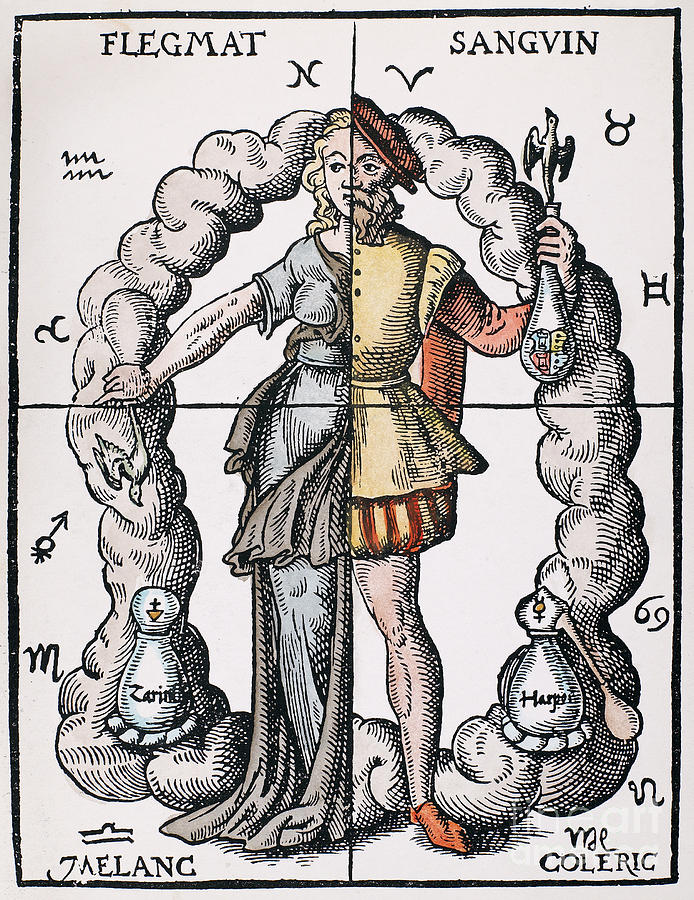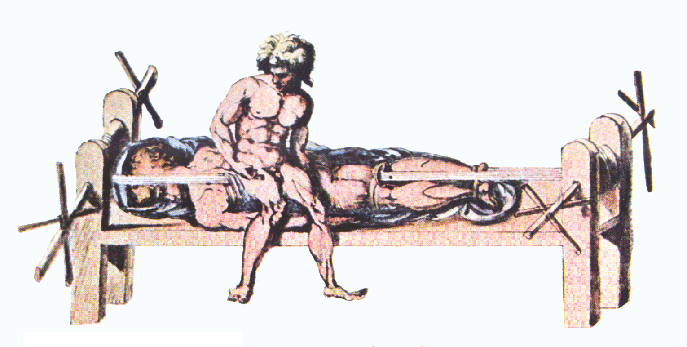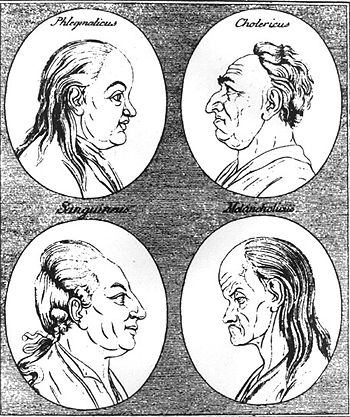
Four Humors Drawing by Granger
If you had assumed that the theory of ‘humours’ had been unanimously relegated to the ‘didn’t work’ shelf of ancient philosophy, then… perhaps you’d be wrong. It appears that Hippocrates’ concept of a four chemical system that affect behavior is enjoying a bit of a revival.
Recently the
New York Times posted an article called,
“Could Ancient Greek Philosophy Help You Work Smarter and Better”, advocating “Humourism” and apparently it’s making the rounds. For those who want a recap, Humourism or humoralism, conceives that there are four basic fluids in the body; blood, phlegm, yellow bile and black bile, and that different levels of these fluids, or humors, affect our personalities.

Engraving by Peter Paul Rubens, 1638, courtesy of the National Library of Medicine.
Hippocrates, and later Galen (129–201 AD), suggested that if there is any imbalance in these fluids, then temperament is affected. Moreover, The imbalance of humors, or dyscrasia, was thought to be the direct cause of all diseases. The qualities of the humours, in turn, influenced the nature of the diseases they caused. For instance, Yellow bile caused warm diseases and phlegm caused cold diseases. The diseases were all combinations of hot/cold and wet/dry.
It’s important to note that while today we associate temperament with just psychological dispositions, the ancients felt it also referred to bodily dispositions. Indeed, a person’s emotional and behavioral inclinations determined their susceptibility to particular diseases.

A drawing of a Hippocratic bench from a Byzantine edition of Galen’s work in the 2nd century AD
One of the treatises attributed to Hippocrates, On the Nature of Man, describes the theory as follows:
“The Human body contains blood, phlegm, yellow bile and black bile. These are the things that make up its constitution and cause its pains and health. Health is primarily that state in which these constituent substances are in the correct proportion to each other, both in strength and quantity, and are well mixed. Pain occurs when one of the substances presents either a deficiency or an excess, or is separated in the body and not mixed with others.”

Table outlining the temperaments
So, what are the exact four temperaments caused by these unfortunate unbalances? These include:
Blood/Sanguine
Blood was believed to have come from the liver, exclusively. Too much of it resulted in a sanguine nature, which is described as enthusiastic, active, social and extremely talkative. ‘Sanguines’ tend to be extroverted, enjoy being part of a crowd and find being social, outgoing, and charismatic easy to accomplish.
Yellow bile/Choleric
Too much yellow bile resulted in a ‘Choleric’ nature, which was believed to produce aggression. On the positive side, ‘Choleric’ temperaments are described as independent, decisive, goal-oriented, and ambitious. In Greek, Medieval and Renaissance times, they were thought of as violent, vengeful, and short-tempered, though apparently they also make natural leaders… who would have thought?
Black bile/Melancholic
The excess of Black bile was believed to cause depression, and indeed, the word “melancholy” derives from Greek μέλαινα χολή (melaina kholé) meaning ‘black bile’. As a temperament description, Melancholics have a predisposition to be deep thinkers, feelers, analytical and detail oriented. They can be introverted, anxious and reserved… as well as a perfectionist.
Phlegm/Phlegmatic
Phlegm was thought to be associated with apathetic behavior, as can be seen in the word “phlegmatic”. On the upside, they are considered relaxed, peaceful, quiet, easy-going, as well as empathetic. Interestingly, the phlegm of humorism is far from the same thing as phlegm as it is defined today…

18th-century depiction of the four temperaments, Phlegmatic and choleric above, Sanguine and melancholic below
This individualistic system of describing human behavior and temperament was hugely influential. It was not only adopted by the Greeks, but also by Roman and Islamic physicians. In fact, this theory dominated Western medical thinking for more than 2,000 years and dictated the view of the human body among European physicians until at least 1543, when it was first challenged. However, the underlying belief in it continued right through the eighteenth century, as evidenced by practices such as bleeding a sick person or applying hot cups. (Tactics that are still employed in many places in the world even today.)
So, perhaps with that in mind, it isn’t so surprising that folks are looking at this theory of human behavior again.
Lifecoach and author of the aforementioned
Times article,
Elizabeth Grace Saunders, explained how understanding your own temperament can help your work flow…and goes so far as to provide tips on how your temperament can be best ‘harnessed’.
Sanguines, for instance, need to break projects into bit-sized chunks. Cholerics should trust more in their co-workers and exercise patience. Melancholics are instructed to limit the time they take on each task while phlegmatic are advised to partner with other temperaments…
Either way, the fact that these ideas have persisted so long may indicate that the Greeks did an excellent job of understanding human personalities…even if the science behind it may not be quite as convincing.














No comments
Trackbacks
Our apologies, you must be logged in to post a comment.